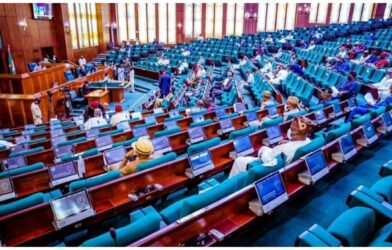He said the president also approved the appointment of Muhammad Hassan Hammajoda to serve as the Secretary of the EFCC for a renewable term of five years in the first instance, pending Senate confirmation.
However, questions have been raised over the legality or otherwise of Olukoyede’s appointment as chairman of the commission, specifically regarding the Section 2 (3) of the EFCC Act 2004 which stipulates that a chairman “Must be a serving or retired member of any government security or law enforcement agency not below the rank of Assistant Commissioner of Police or equivalent; possess not less than 15 years’ experience.”
Ngelale said the appointments were based on the powers vested in the president as established in section 2 (3) of the EFCC (Establishment) Act 2004.
He quoted the section as stipulating that “The chairman and members of the commission, other than ex-officio members, shall be appointed by the president,” Ngelale said Olukoyede is “A lawyer with over 22 years of experience as a regulatory compliance consultant and specialist in fraud management and corporate intelligence.”
He said since Olukoyede has extensive experience in the operations of the EFCC, having previously served as Chief of Staff to the executive chairman (2016-2018) and secretary to the commission (2018-2023), “he fulfills the statutory requirement for appointment as chairman of the EFCC.”
He said Tinubu tasked the new leadership of the EFCC to justify the confidence given to them in this important national assignment as a newly invigorated war on corruption undertaken through a reformed institutional architecture in the anti-corruption sector remained a central pillar of the president’s “Renewed Hope” agenda.
“Mr. Muhammad Hassan Hammajoda is a public administrator with extensive experience in public finance management who holds a Bachelor of Science degree in Accounting from the University of Maiduguri and a Masters in Business Administration from the same university. He began his career as a lecturer at the Federal Polytechnic, Mubi. From there, he went into banking, including successful stints at the defunct Allied Bank and Standard Trust Bank,” he said.
Olukoyede’s appointment violation of law-ActionAid Nigeria
In a chat with Daily Trust, Country Director, ActionAid Nigeria, Andrew Mamedu, alleged that Olukoyede’s appointment was an apparent violation of the EFCC Act.
He said Section 2(3) of the Act was unambiguous and could not be overlooked.
He stated: “This section distinctly outlines the stringent criteria for appointing the chairman of the commission, mandating them to be a serving or retired member of a government security or law enforcement agency not below the rank of Assistant Commissioner of Police or its equivalent, with a minimum of 15 years of experience.
“In the face of this apparent violation of the law, it is not only the right but the solemn duty of the National Assembly to wield its oversight powers with unwavering resolve. They must delve into the appointment process with a discerning eye, leaving no room for legal or procedural violations to go unaddressed. It is incumbent upon them to uphold the integrity of our institutions and ensure that the rule of law prevails, by swiftly and resolutely revoking this illegal appointment.”
Lawyers divided
Lawyers who spoke to Daily Trust on the issues held different views on Olukoyede’s qualification for the appointment.
“There are laid-down rules and guiding principles for the appointment of the EFCC chairman. These rules are contained in the Act, which specifies that the appointee must be either a retired ACP of a rank similar to that of an ACP. This is a law that must be enforced.
“If the law is not obeyed during the appointment, it implies that the appointment is unlawful.
“For me, I have once challenged even the EFCC Act itself because the procedure for its establishment was not duly followed by the National Assembly. We challenged it in court. So, I’m not ruling out the possibility that others will go to court to challenge this appointment.
“I’m still assessing the circumstances surrounding the situation, and it’s possible we might be part of those who will challenge this appointment,” he said.
Another Senior Advocate of Nigeria, who spoke to Daily Trust on condition of anonymity, said, “If there is a breach of the law, it is the duty of the Senate to intercept that and remedy it.
“It is a way of compromising the EFCC to make it a toothless bulldog that would not do anything for the country.”
Director, Abuja School of Social and Political Thought, Nigeria, Sam Amadi, said President Tinubu breached the provisions of the EFCC Act in the appointment of the commission’s chairman.
He said: “It might be politically convenient, but it entrenches impunity and lack of respect for the rule of law.
“After him, someone will take it a notch higher and abrogate the constitution. Time to end Buhari’s legacy.”
However, Victor Opara, SAN, in his own reaction, said: “The appointment of the new EFCC chair is perfectly made and is in order. Section 2 of the EFCC Act stipulates that the person to be appointed (as chairman) must be either serving or retired and must have worked in a law enforcement agency who must not be below the rank of Assistant Commissioner of Police”.
Ebun-Olu Adegboruwa, SAN, said Olukoyede “Is qualified, having been Chief of Staff. Going by his position and salary, he is qualified.”
He, however, noted: “My concern is not about his qualification, but why are all the appointments coming to South West?”
An EFCC insider who understands the workings of the commission also stated that Olukoyede ought not to be appointed as chairman “Because he is not a member of any of any security agency or law enforcement agency.
“The only experience he had at the EFCC was as a secretary, which is a non-operational department.
“If someone is coming in as EFCC chairman who doesn’t have the requisite qualification, it is actually going to affect the capacity of the commission to carry out its work,” he said.
In another statement released yesterday evening, the presidential spokesman, Ajuri Ngelale, said Olukoyede satisfied every legal requirement to be appointed as EFCC chairman.
He said apart from having been the Chief of Staff to the Executive Chairman of the EFCC (2016-2018) and Secretary to the Commission (2018-2020), Olukoyede was “A member of a law enforcement organisation as secretary, in this case the EFCC, as stipulated in the EFCC Act, and as such satisfied every legal detail to be appointed as chairman.”
He stated: “Section 2(1)(p) of the EFCC Act plainly, ordinarily, and unambiguously established the secretary to the commission (i.e., EFCC) as its member and head of its administration.
“The Supreme Court determined in the case of Ejuetami v. Olaiya & Anor (2001) LPELR-1072 (SC) at Pg.23-24, that: The words used are to be given their ‘ordinary and natural sense’. Therefore the clear, explicit and unambiguous words used in sections 2(1)(a)(i)-(iii), (p), 2(2), 3(1)-(3) and 8(5) of the EFCC Act must be given their ordinary and natural sense in line with the guidelines set by the Supreme Court in its long line of undisturbed judicial precedents.
“It is clear from the unambiguous provisions of the EFCC Establishment Act, 2004, that any member of the commission whether serving or retired who has 15 years’ cognate experience in their chosen career is eligible to be appointed as the chairman of the commission.
“Prior to this time, the convention and precedence is that to be qualified for appointment as the Executive Chairman of the commission, the nominee must be a police officer or someone with law enforcement background, particularly in the area of investigation. This has not only exposed the commission to all manner of vices but has brewed internal wrangling, discontent, and hatred among the members of staff of the commission.
“It is nonjusticiable to elevate convention above statutory provision. It is time to move away from fiction to fact and from convention to strict adherence to the statutory provisions of the enabling Act of the commission in our constitutional democracy.












Comments are closed